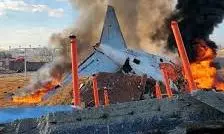
South Korea | Jeju plane crash: 151 confirmed dead; 'take full responsibility', says airlines CEO
The incident occurred when the Jeju Air flight from Bangkok, with 175 passengers and six crew members aboard, skidded off the runway and hit a wall at Muan International Airport

At least 179 of the 181 passengers aboard a Jeju airplane are feared killed after it crashed on the runway during landing in South Korea’s Muan city on Sunday (December 29). So far, authorities have confirmed 151 deaths, according to reports.
The incident reportedly occurred when the Jeju air flight from Bangkok, with 175 passengers and six crew members aboard, skidded off the runway and hit a wall at Muan International Airport.
According to reports, the flight was returning to Muan from Bangkok, Thailand.
The incident comes in the wake of the Azerbaijan Airline plane crash near Kazakhastan’s Aktau last week in which 38 of the 67 people on board were killed.
Also read | Azerbaijan plane crash | Bird strikes a big threat to aviation safety
Take full responsibility: Jeju Air CEO
In a statement, Jeju Air CEO Kim E-bae said he takes full responsibility for the accident.
Expressing his condolences to the family of the deceased, he said, “regardless of the cause, I take full responsibility as the CEO.”
The airline has said that it will spare no effort to respond to the accident.
“We are currently working to determine the exact cause and details of the situation,” Yonhap News agency quoted a company official as saying.
The official said that the aircraft had been in operation for 15 years and had no history of accidents.
‘Aircraft had no abnormality before take-off’
According to Yonhap, the Boeing 737-800 suffered a landing gear failure.
Kerati Kikmanawat, the president of Thailand’s main airport operator Airports of Thailand (AOT), however, said that the aircraft had no abnormal conditions when it departed Bangkok.
“At that time, relevant agencies made no reports of bird strikes or obstacles on the runway,” he said in a statement.
"AOT places the highest importance on the safety of its aircraft and passengers by continuously inspecting the runway, lighting systems, bird repellent systems, and maintaining them, while complying with international safety standards,” he added.
Probe initiated
The ruling People Power party has formed a task force to probe the incident. The party’s acting leader, Kweon Seong-dong is also slated to visit Muan on Monday (December 30) with members of the task force to review “accident response measures and prevention strategies” and meet the families of the deceased.
Acting President Choi Sang-mok has declared Muan a special disaster zone, enabling emergency relief measures and financial aid to affected regions and residents. The designation facilitates swift government action to address the aftermath of large-scale natural or man-made disasters, according to Yonhap News.
Rescue efforts underway
Emergency teams continue to scour the wreckage, with additional bodies believed to remain trapped within the fuselage. Two survivors — a passenger and a crew member — were found in the tail section and are currently receiving treatment at a nearby hospital.
The aircraft attempted a belly landing at approximately 9:03 am local time after its landing gear failed to deploy. Witnesses described hearing loud “bang” noises moments before the plane collided with the airport’s perimeter wall, splitting into two and erupting into flames.
'Chances of survival extremely low'
Rescue personnel say there is no likelihood of any survivors given the impact of the crash.
“After the plane collides with the wall, passengers were thrown out of the aircraft. The chances of survival are extremely low. The aircraft has almost completely been destroyed, and it is difficult to identify the deceased. We are in the process of recovering the remains, which will take time,” Yonhap News Agency quoted a firefighting official as saying.
This marks the first major casualty incident involving a low-cost carrier in South Korea’s history. Other significant aviation tragedies in the country include the 1993 Asiana Airlines crash in Mokpo, which killed 68, and the 2002 Air China crash near Gimhae Airport, which claimed 129 lives, according to a Guardian report.

